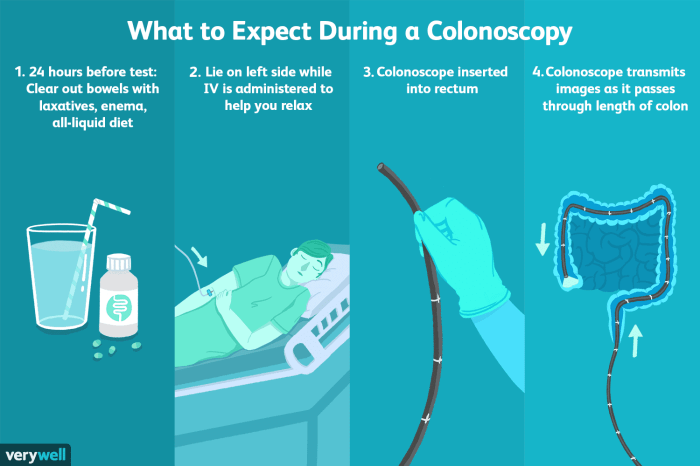
Benefits of colonoscopy screenings for colon health are crucial for early detection and prevention of colon issues, ensuring overall well-being. Let’s delve into how these screenings play a vital role in maintaining a healthy digestive system and a better quality of life.
Colonoscopy screenings not only help in detecting abnormalities early but also contribute to a healthier lifestyle.
Importance of Colonoscopy Screenings
Regular colonoscopy screenings are crucial for maintaining colon health as they play a significant role in the early detection and prevention of colon cancer. These screenings can help identify any polyps or abnormalities in the colon before they have a chance to develop into cancerous tumors.
Recommended Frequency and Age for Colonoscopy Screenings
It is generally recommended that individuals start getting regular colonoscopy screenings at the age of 50. However, for those with a family history of colon cancer or other risk factors, screenings may need to begin earlier. The frequency of screenings can vary depending on the individual’s risk profile and any findings from previous screenings.
Benefits of Early Detection through Colonoscopy Screenings
Early detection of polyps and other abnormalities through colonoscopy screenings can greatly increase the chances of successful treatment and survival. By removing precancerous polyps during the screening, the risk of developing colon cancer is significantly reduced. This preventive aspect of colonoscopy screenings can ultimately save lives and improve overall colon health.
Procedure and Process of Colonoscopy
Colonoscopy is a crucial procedure for detecting and preventing colon cancer. Here, we will Artikel the steps involved in a colonoscopy, from preparation to recovery.
Preparation for Colonoscopy
Before a colonoscopy, patients are required to follow a strict preparation regimen to ensure a clear view of the colon. This typically involves fasting for a certain period and taking laxatives to empty the bowels completely.
Technology and Tools Used
During a colonoscopy, a long, flexible tube with a camera at the end, known as a colonoscope, is inserted into the rectum and guided through the colon. The camera transmits images to a monitor, allowing the doctor to examine the colon’s lining carefully.
Recovery Process and Post-Procedure Care
After the colonoscopy, patients are monitored in a recovery area until the sedation wears off. Some patients may experience bloating or cramping initially, but these symptoms typically resolve quickly. It is essential to follow any post-procedure instructions provided by the healthcare provider to ensure proper recovery and care.
Benefits of Colonoscopy Screenings for Digestive Health
Colonoscopy screenings play a crucial role in maintaining overall digestive health by allowing early detection and treatment of various digestive issues.
Early Detection and Treatment of Digestive Issues, Benefits of colonoscopy screenings for colon health
- Colonoscopy screenings can detect conditions such as inflammatory bowel disease (IBD), diverticulosis, and polyps, which can lead to more serious digestive problems if left untreated.
- By identifying these issues early on, colonoscopy screenings enable healthcare providers to intervene promptly and prevent the progression of digestive diseases.
Maintenance of a Healthy Digestive System
- Regular colonoscopy screenings help in monitoring the health of the colon and rectum, promoting early intervention and treatment of any abnormalities that may arise.
- Through the removal of precancerous polyps during the procedure, colonoscopy screenings reduce the risk of developing colorectal cancer, ultimately contributing to a healthier digestive system.
Additional Benefits for Digestive Health
- Colonoscopy screenings can also detect gastrointestinal bleeding, ulcers, and other sources of digestive discomfort, leading to appropriate treatment and symptom relief.
- Furthermore, the procedure allows for the evaluation of unexplained symptoms such as chronic diarrhea, abdominal pain, and changes in bowel habits, aiding in the diagnosis and management of digestive disorders.
Relationship Between Colon Health and Overall Well-being

Maintaining a healthy colon is not only crucial for digestive health but also plays a significant role in overall well-being and quality of life. The condition of the colon can impact various aspects of health, including immunity, energy levels, and even mental well-being.
By prioritizing colon health through screenings and preventive measures, individuals can experience a range of holistic benefits that contribute to a healthier lifestyle.
Impact on Immunity and Energy Levels
- Poor colon health can lead to the accumulation of toxins and harmful bacteria, which may compromise the immune system’s function.
- An unhealthy colon can also result in nutrient absorption issues, leading to low energy levels and fatigue.
- Regular colonoscopies can help detect and prevent conditions that may affect immunity and energy, promoting overall well-being.
Connection to Mental Well-being
- Studies have suggested a link between gut health, including colon health, and mental health conditions such as anxiety and depression.
- By maintaining a healthy colon, individuals may experience improved mood and cognitive function, contributing to overall well-being.
Overall Holistic Benefits
- Optimizing colon health through screenings can reduce the risk of developing serious digestive issues and related health conditions.
- A healthy colon can support efficient digestion, nutrient absorption, and waste elimination, promoting a balanced and healthy body.
- Prioritizing colon health as part of a wellness routine can lead to a more vibrant and active lifestyle, enhancing overall well-being.
Last Word
In conclusion, prioritizing colon health through regular screenings can have a profound impact on overall well-being, emphasizing the importance of proactive healthcare measures.
General Inquiries: Benefits Of Colonoscopy Screenings For Colon Health
How often should individuals undergo colonoscopy screenings?
It is recommended for individuals to start regular colonoscopy screenings at age 45-50 and repeat every 10 years if results are normal.
Can colonoscopy screenings detect issues other than colon cancer?
Yes, colonoscopy screenings can detect and treat various digestive issues such as inflammatory bowel disease and ulcers.





